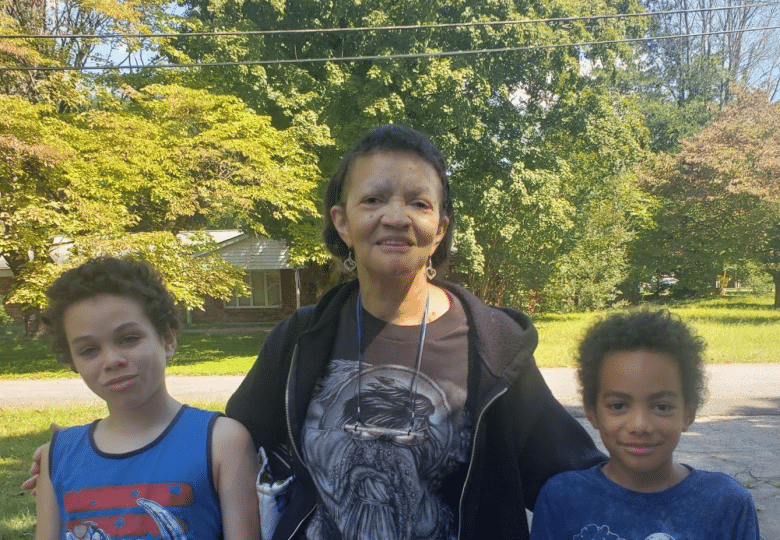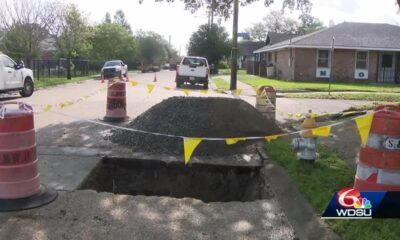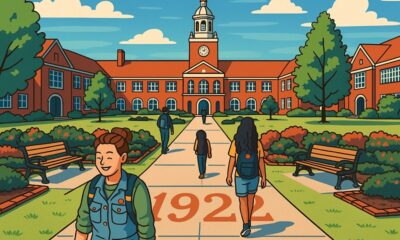News from the South - North Carolina News Feed
Daughter’s six-week search for missing parents marked by miscommunication, false sightings, DNA samples • Asheville Watchdog

Asheville Watchdog is bringing you the stories behind the staggering loss of life from Helene, the children, parents, grandparents, multiple generations of a single family, all gone in one of the worst natural disasters to hit the mountains of western North Carolina. This is the ninth installment.
The sorrow and torment are sadly familiar by now: A daughter desperately searching for her missing parents only to discover they were never coming back.
Nola and Robert Ramsuer died when floodwaters overtook their Swannanoa riverside trailer in Tropical Storm Helene.
But for daughter Shalana Jordan, getting to that agonizing answer took six weeks and included multiple searches through mud-caked debris, repeated calls to aid agencies, false sightings from well-meaning strangers, and a bureaucratic labyrinth that often appeared inept at tracking the missing and the dead.
Read previous installments of The Lives We Lost.
The Ramsuers, both 70, were among the 43 officially lost in Buncombe County to the Sept. 27 storm.
For loved ones left behind, navigating a chaotic disaster even with help pouring in from across the U.S. can be frustratingly slow and painful.
For Jordan, 40, of Winston Salem, it meant days of scouring social media posts and helicopter footage for clues about her parents, sending friends and relatives to shelters to see if they were there, providing DNA samples not once but twice, and waiting six weeks for confirmation that remains found within 10 days of the storm were those of her mother and father.
Jordan, mother of two boys, Aiden, 8, and P.J., 9, had to juggle their school needs and her own chemotherapy for a genetic disorder while searching for answers.
Holding onto hope amid the wreckage
On the morning of the storm, Jordan texted with her mother as she usually did. Around 7:30 a.m., her mother reported the power had gone out.
“She said it, like, almost funny…‘It’ll come back on again later,’” Jordan said. “She stopped texting me around eight.”
Jordan assumed her mother had gone to work at her custodian’s job at the Black Mountain Neuro-Medical Treatment Center. Her father, a Vietnam War veteran who had been in declining health, still worked a couple of days a week in maintenance for Cracker Barrel.

When Jordan couldn’t reach them that night, she figured they’d gone to bed early. The next day, images of the destruction began appearing on social media.
“I messaged all my family in Asheville, thinking maybe they called one of them and were with them, or maybe they didn’t have their phones,” Jordan said.
Over the next hours and days, she searched a Swannanoa Facebook page, scanning photos of water pickup and donation sites for any signs of her parents. She watched hours of helicopter video footage and finally spotted her parents’ trailer park on Avery Wood Drive. Many of the trailers were gone.
Benjamin Larrabee, the Ramsuers’ next-door neighbor, recorded videos of the floodwater surging through the trailer park, sweeping up semi-tractor trailers and pushing them downstream past the Ramsuers’ home.
“Man, the whole trailer just moved,” Larrabee can be heard saying on one video as the water carried two semis past the Ramsuers. “Oh man, I hope these guys are going to be all right.”
One of the trucks eventually crashed into the Ramsuers’ trailer, ripping off one end, Jordan said.
Inside, she said, the water came up to the hood above the stove; a couch had been lifted off the floor and landed on the kitchen counter.
Neither of her parents could swim. But their home was still standing.
Jordan held out hope that maybe they made it to a shelter but determining that proved no easy task.
“During all of the first three weeks, we were checking shelters,” Jordan said. “There weren’t any lists of who was in the shelters. I had to physically send people there while I was in Winston Salem.”

Jordan posted about her parents on social media and gave interviews to national media in hopes of generating leads. Her phone pinged non-stop with hopeful, but false tips.
“People message you and comment on your posts all day, every day, from six in the morning until 2 a.m. at night,” she said. “‘I think I saw them here. I think I saw them there.’”
Jordan made the two-hour trip to her parents’ home four times, traipsing through mud and debris outside and inside the trailer with relatives and her fiance, Edward Jordan. “The mud was so thick in one of the back bedrooms, I was like, what if they’re in here in the mud, and we’re walking over them?” she said.
Her own health made searching difficult. Jordan’s legs and ankles swell, and chemo leaves her weak and in pain, she said.
At one point, she injured her ankle in the remnants of the trailer. “I fell through the floor,” Jordan said, “because it was getting soft from all the mud and the moisture.”
Jordan called every government and aid agency she could think of to report her parents missing.

“Nobody would take a description of them. No one would take photos. It was crazy,” she said. “I know that it was an unprecedented situation, but FEMA, [the American] Red Cross, like they do this every day. Disaster is their only job.”
An arduous wait for confirmation
Sixteen days after the storm, Jordan said she received a call from a Buncombe sheriff’s executive asking for a description of the clothes her parents were wearing.
Three days later, “I got a call from the medical examiner in Raleigh saying that they think they found my parents,” Jordan said.
She did not know then, but death certificates completed later showed her mother’s body had been found Oct. 4, and her father’s Oct. 7, more than a week earlier.
“We were hunting and wasting resources this whole time,” Jordan said, “if we could have been allowed to identify bodies, or if someone had been in charge of missing persons, to say we recovered X, Y and Z bodies.

“How many resources did I waste that could have been used helping someone else or finding someone else because we had tons of community help, people searching on foot, cadaver dogs, people shoveling out mud for us?”
Dr. Craig Nelson at the Office of Chief Medical Examiner in Raleigh told Jordan the bodies believed to be her parents still had to be transported to Raleigh for examination and confirmation, she said.
Around the same time, the Buncombe Sheriff’s Office had been in contact with Jordan and sent a Winston Salem police officer to her home to collect DNA samples to match them against the remains.
The same day, about 20 minutes later, Nelson called to arrange to collect her DNA. Jordan told him, “They already came, and he was like, ‘What are you talking about?’”
Nelson said he would look into it and called back to say the first sample was headed to a Buncombe County lab, and results would take three to six weeks, Jordan said.
The Raleigh medical examiner’s lab could match the sample faster, in about a week, but she would need to provide a second round of DNA, “so more officers came and got samples,” Jordan said.
In early November, Nelson delivered the results.
“He said, ‘I’m so sorry,’” Jordan said. “My parents remains’ broke down too much during this process, and they couldn’t even get anything from their DNA samples.”
More samples were collected from the remains, and the medical examiner’s office conducted another round of testing. “We had to wait another week,” Jordan said.
She said Nelson “went above and beyond” and kept her updated daily.
The medical examiner’s office did not respond to a request for comment by deadline.
On Nov. 12, more than six weeks after the storm and five weeks after her parents’ bodies had been found, Jordan received official confirmation of their deaths.
By then, the family had already held a memorial service. Jordan said she did not want to wait with unpredictable winter weather approaching.
And she said she knew in her heart her parents were gone, especially after the discovery of a plastic bag inside their trailer with her mother’s purse, her father’s wallet, debit cards and mementos. She thinks they were planning an escape.
Also inside the bag: her mother’s cell phone, the same one she’d been texting and calling for days.
“She didn’t even have her phone,” Jordan said. “We were all just texting no one.”
Memorial brings unexpected costs, tributes
The Ramsuers’ funeral and cremation costs totaled more than $3,000 and included a “transport fee” to drive their remains from Raleigh to a funeral home in Swannanoa, Jordan said. “It’s $3 a mile to transport a body,” she said.
Cracker Barrel, her father’s employer, catered the memorial service and paid a portion of the costs, she said. The Red Cross paid the transport fee and other expenses.
The Federal Emergency Management Agency declined to pay, she said, because her father was entitled to funeral benefits as a veteran, about $300. With community donations, Jordan said the family expects to be fully reimbursed for the funeral costs.
Jordan said she’s heard from many of her parents’ friends, neighbors and co-workers, “the only good thing out of all this,” she said. “Not a handful, not dozens, but hundreds of people.”
Robert Ramsuer, a Buncombe native, served in the U.S. Army. “He saw a lot of crazy stuff” in Vietnam and served two tours after the war, his daughter said.
She described him as a spitfire who always had a story to tell. He loved fishing and hunting.
“People messaged me saying, ‘Your dad taught me how to fish 40 years ago; your dad taught me martial arts 30 years ago,’” Jordan said.
Nola Ramsuer was “very soft spoken and sweet,” she said. She baked cakes for friends’ and coworkers’ birthdays and hosted Christmas for their extended family.

One former coworker told Jordan how he’d talked to her mother about the many medications he was taking for lupus, an autoimmune disorder Jordan also has. Her mother went online and researched alternatives “and sent him these printouts of holistic things he could try to be able to get off all the medication,” Jordan said.
‘Life is so fragile’
Jordan recently collected her parents’ ashes from the Penland Family Funeral Home in Swannanoa. She said she purchased two memorial boxes, each a size large accommodating the remains of a 300-pound person, more than enough for her 140-pound father and 110-pound mother.
But Jordan said a funeral home representative informed her that her mother had been found in the mud.
He said, “‘We tried to remove as much material from her as we could, but there still was a lot mixed in, so all of her doesn’t fit inside of the box,’” Jordan said.
She said she received two boxes with her mother’s remains.
Funeral home representatives did not respond to messages seeking comment.
Jordan said that while her father had been ill, she expected to have another 20 or 30 years with her mother, who came from a family in which women lived well into their 90s, one making it to 104.
“I thought I had more time,” Jordan posted on Facebook. “Life is so fragile and can be gone in an instant.”
Asheville Watchdog is a nonprofit news team producing stories that matter to Asheville and Buncombe County. Sally Kestin is a Pulitzer Prize-winning investigative reporter. Email skestin@avlwatchdog.org. The Watchdog’s reporting is made possible by donations from the community. To show your support for this vital public service go to avlwatchdog.org/support-our-publication/.
Related
The post Daughter’s six-week search for missing parents marked by miscommunication, false sightings, DNA samples • Asheville Watchdog appeared first on avlwatchdog.org
News from the South - North Carolina News Feed
Trump says ‘Crimea will stay with Russia’ as he presses for deal to end war in Ukraine

SUMMARY: Trump declared that “Crimea will stay with Russia” while seeking negotiations to end the Ukraine war. His envoy, Steve Wickoff, is headed to Russia to meet President Putin amid escalating violence, including a drone strike that killed three people in Ukraine. Meanwhile, a senior Russian general was killed near Moscow in a bombing, although no one has claimed responsibility. Tensions rise as Ukraine’s President Zelensky refuses to accept the annexation of Crimea, emphasizing that it conflicts with Ukraine’s constitution. Both sides express the desire for peace, but differing views complicate potential compromises and ceasefire efforts.

Trump says ‘Crimea will stay with Russia’ as he presses for deal to end war in Ukraine.
Download the WRAL App: https://www.wral.com/download-wral-apps/5787234/
The Latest Weather: https://www.wral.com/weather/page/1010362/
News Tips:
Online – https://www.wral.com/report-it/
Email – assignmentdesk@wral.com
Subscribe to WRAL:
https://youtube.com/c/wral5
Follow WRAL:
Facebook: https://facebook.com/WRALTV
X: https://twitter.com/WRAL
IG: https://instagram.com/wral
About WRAL-TV:
WRAL is your Raleigh, North Carolina news source. Check out our videos for the latest news in Raleigh, local sports, Raleigh weather, and more at https://WRAL.com
#localnews #northcarolina
News from the South - North Carolina News Feed
Where does Asheville Tourists’ concessions money go? Will local schools be impacted by federal DEI mandates? • Asheville Watchdog

Today’s round of questions, my smart-aleck replies and the real answers:

Question: I want to know if I go to an Asheville Tourists baseball game and pay the full price for a ticket, and buy two beers and two hot dogs, what’s the total cost for that? And how much of that goes to the DeWine organization? How much goes to the city?
My answer: I’m pretty sure most baseball stadium food, including this proposed meal, comes with a personal defibrillator.
Real answer: As we’ve previously reported, the Asheville Tourists Baseball Club is owned by the DeWine Seeds Silver Dollar Baseball LLC, which is owned by the family of Ohio Gov. Mike DeWine. DeWine’s son Brian is the president of the team and the owner-operator with his wife, Kali.
It seems like whenever Gov. DeWine, a Republican, makes some news in Ohio, I get some questions about the local team here and where the money goes. As we reported in 2022, the governor “personally owns 32 percent of the team, according to records, but has no management role in the team.” Brian DeWine, a resident of Asheville since 2010, calls the Tourists ‘a local, family-owned business.’”
Now, about those dogs and brews. First, Brian DeWine tried to upsell the fan.

“Are you sure your reader doesn’t also want to wash that down with a deep-fried moon-pie? Or a churro sundae?” DeWine asked.
Tempting, but I think they were hoping to live at least until Sunday.
“A beer is going to be $8-$9 and $1 and $3 on Thirsty Thursday,” DeWine said. “Hotdogs are $3.75, except on Fridays when they are $1.”
Tickets start at $9.50 for kids, $10.50 for military and seniors and $11.50 for an adult, he added, noting that all prices include sales tax. So under normal conditions, it looks like you’d be dropping $35 to get in, scarf down two ‘dogs and two beers, and enjoy the game.
The Tourists run the complete food and beverage operation, so the city, which owns McCormick Field, does not reap any financial benefits from it.
“The city does not collect a portion of food and beverage sales during baseball games at McCormick; we do however collect an annual rent payment from the team,” Chris Corl, the city of Asheville’s director of community and regional entertainment facilities, said via email. “This year’s rent is lower than ‘normal’ due to disruptions related to the construction project.”
The 2025 season at McCormick Field is being played “under construction,” as DeWine previously told The Watchdog. Some areas of the ballpark will be closed to fans during certain parts of the season, as the stadium undergoes a $38.5 million renovation project to comply with dictates from Major League Baseball to upgrade locker rooms and other facilities.
Corl provided the city’s rental rates for McCormick Field for last year, this year and next year:
- 2024: $100,000
- 2025: $50,000
- 2026: $450,000
The Tourists had their home opener April 8, although it was a rainy affair. The team’s 132-game schedule this year features 66 home games, including matchups on July 4, Mother’s Day, Memorial Day Weekend, and Labor Day Weekend.

Question: I haven’t heard any communications from the Asheville City Schools superintendent or the Buncombe County Schools district on how they are handling the Trump administration’s attack on DEI (diversity, equity and inclusion). I know that the ACS central office does have a fulltime staff member committed to equity, but I have not heard anything about changes in its programming or staffing. Might make for an interesting article to reach out to the Districts to ask what they are doing to respond to Trump’s and the Department of Education’s blocking of funding for districts with DEI policies or programs.
My answer: They’re keeping mum? Really? That’s odd in this climate …
Real answer: Asheville City Schools Chief of Staff Kimberly Dechant answered on behalf of city schools.
“At this time, Asheville City Schools remains committed to its mission of fostering an inclusive and equitable environment for ALL students and staff,” Dechant said via email (emphasis on “ALL” was hers). “There have been no changes to our programming or staffing related to Diversity, Equity, and Inclusion.”
On April 3, the Trump administration’s Department of Education sent a “reminder” notice to school systems titled, “Reminder of Legal Obligations Undertaken in Exchange for Receiving Federal Financial Assistance and Request for Certification under Title VI and SFFA v. Harvard.”
The court reference refers to the 2023 U.S. Supreme Court ruling in Students for Fair Admissions v. Harvard University and UNC Chapel Hill, which essentially banned consideration of race in college admissions.
The reminder notice sent to schools further states: “Title VI of the Civil Rights Act of 1964 provides that ‘no person in the United States shall, on the ground of race, color, or national origin, be excluded from participation in, be denied the benefits of, or be subjected to discrimination under any program or activity receiving federal financial assistance.”
As NPR reported last week, in its latest DEI directive to K-12 school leaders, “the Trump administration has asked every state and local school leader to recommit to Title VI of the Civil Rights Act, which prevents race-based discrimination for federally funded programs. It says states that fail to recertify could lose their federal funds, including grants intended for low-income students.”
(On Thursday, a federal judge ruled that the Trump’s administration had overstepped the executive branch’s legal authority over local schools and had not provided a sufficient definition of DEI.)
Dechant said ACS is “closely monitoring developments at both the federal and state levels regarding any potential legislation or policy changes that may impact DEI initiatives.
“Until such legislation is passed and its implications are clarified, we will maintain our current approach and continue to prioritize equity in education for ALL students,” Dechant said, again emphasising “all.”
At Buncombe County Schools, spokesperson Ken Ulmer said the system “continues to comply with all federal, state, and local laws.
“Buncombe County Schools does not have any dedicated positions such as diversity officers,” Ulmer said. “As a school system, BCS is committed to serving each and every student in our district with the respect, support, and opportunities they deserve.”
The county system does have Assistant Superintendent Jamie Johnson’s role listed on its website as “Educational Equity and Student Support.”
Asheville Watchdog welcomes thoughtful reader comments on this story, which has been republished on our Facebook page. Please submit your comments there.\
Asheville Watchdog is a nonprofit news team producing stories that matter to Asheville and Buncombe County. Got a question? Send it to John Boyle at jboyle@avlwatchdog.org or 828-337-0941. His Answer Man columns appear each Tuesday and Friday. The Watchdog’s reporting is made possible by donations from the community. To show your support for this vital public service go to avlwatchdog.org/support-our-publication/.
Related
The post Where does Asheville Tourists’ concessions money go? Will local schools be impacted by federal DEI mandates? • Asheville Watchdog appeared first on avlwatchdog.org
News from the South - North Carolina News Feed
Lesson learned: How the pandemic provided a teachable moment for NC lawmakers in latest Helene relief bill

There’s going to be a full house in Ashe County’s public schools this summer. After a mix of bad weather and severe storms closed schools there for 47 days, Superintendent Eisa Cox plans to take full advantage of a Helene learning loss summer school program. It’s funded by the legislature in its most recent recovery bill.
The $9 million School Extension Learning Recovery Program is open to schools in 13 impacted Western North Carolina counties: Ashe, Avery, Buncombe, Burke, Haywood, Henderson, Madison, McDowell, Mitchell, Rutherford, Transylvania, Watauga and Yancey.
It covers grades 4 through 8 and focuses on intensive recovery in math and reading. Each participating school will receive at least $20,000 for the program and possibly double that, depending on how much state money is left over after all schools get initial funding.
While one of the lower-dollar items in the $524 million recovery package, the summer school program could mean a lot for Ashe County students. The school system already uses grant funding to run summer programs for various grades. Still, without state funds, having a “robust” learning loss program serving multiple grades in different schools would have been impossible, Cox said.
“That’s a hefty price in order to be able to do that for kids,” she said. “You’re talking about feeding them, transportation, the cost of the teacher over the summer, and, of course, you don’t want to put 30 kids in a class. That’s not going to achieve what you want for students who are already struggling to be on grade level.”
Helene learning loss overlooked — at first
While Gov. Josh Stein’s Helene recovery request included a summer learning loss program, the first version of the General Assembly’s Helene recovery bill didn’t offer a penny for public schools.
State Rep. Marcia Morey, D-Durham, took note. She recalled a retreat where she spoke with public school leaders from Western North Carolina who told her how “dire” the need was to get back in the classroom. Four years out, students were still recovering from pandemic learning loss. Helene only exacerbated the issue.
“We have eight counties. We have at least four schools (where) kids couldn’t go back — they had to go to other facilities,” she said in February on the House floor. “We have two schools totally decimated. And so we’re not doing it today, but our public school kids need a place to go. They need a facility. I hope in the next bill we will address the children out west in these affected counties.”
Morey tried to file an amendment to the legislature’s initial bill, but was told she was too late.
The next version of the bill included a $9 million summer learning program.
Morey said she wasn’t directly involved.
“I think they just knew they had to respond to it,” she told Carolina Public Press. “It was astounding that nothing was included in the first relief bill.”
Lessons from the pandemic
Not all missed school days are created equal. Losing one day could take a few hours, a day or a week to recover, depending on the grade level and subject matter.
For example, earlier grades typically learn a “mile wide” and an “inch deep,” covering a broader range of subjects than later grades, which tend to focus on one or two concepts, explained Jeni Corn, the impact evaluation and strategy director for the North Carolina Collaboratory.
This can make it harder for younger students to make up for lost time. Additionally, math concepts typically take longer to recover than those involving social studies.
The legislature first partnered with the North Carolina Collaboratory, housed at UNC-Chapel Hill, to research the impacts of the pandemic on K-12 education. Among the various studies was one looking at the effect of a state-funded summer school program designed to address pandemic learning loss.

That study now forms the basis of the Helene summer school program, Corn said.
Researchers found that higher summer school attendance correlated with better attendance the following academic year for students in grades 4 through 8 and seventh and eighth graders. They also discovered modest gains in math test scores among students who had high summer attendance, but no impact on reading scores.
Summer school programs can’t cure all learning loss, but they can improve student engagement through continued connection with their fellow peers and teachers, the researchers concluded.
Cox, the Ashe County superintendent, came to the same determination. A dozen days of summer school is never going to be enough time to recover from weeks of learning loss, but it can still help.
“When kids aren’t in school, they may not have a meal,” Cox said. “When kids are not in school, they may not have an adult around them during most of the day that can help them provide the structure to be able to read to them, to be able to provide them with direction.”
This article first appeared on Carolina Public Press and is republished here under a Creative Commons Attribution-NoDerivatives 4.0 International License.![]()
The post Lesson learned: How the pandemic provided a teachable moment for NC lawmakers in latest Helene relief bill appeared first on carolinapublicpress.org
Note: The following A.I. based commentary is not part of the original article, reproduced above, but is offered in the hopes that it will promote greater media literacy and critical thinking, by making any potential bias more visible to the reader –Staff Editor.
Political Bias Rating: Center-Left
The content presents information regarding a summer learning program in Western North Carolina aimed at addressing the educational impact of the pandemic, specifically referring to "Helene learning loss." The mention of lawmakers and educators collaborating to implement a state-supported program suggests a mildly progressive viewpoint, as it emphasizes government involvement in addressing educational challenges. Additionally, the sourcing from Carolina Public Press, described as an "independent newsroom" committed to uncovering overlooked issues, aligns with narratives often found in Center-Left media that advocate for social responsibility and public welfare initiatives. Overall, while the content is informative and not overtly biased, the context indicates a leaning towards Center-Left perspectives related to governance and education policy.
-

 News from the South - Florida News Feed5 days ago
News from the South - Florida News Feed5 days agoJim talks with Rep. Robert Andrade about his investigation into the Hope Florida Foundation
-

 News from the South - Alabama News Feed7 days ago
News from the South - Alabama News Feed7 days agoOp-Ed: Colleges shouldn’t need remedial algebra classes: Five K-8 policy solutions to address math proficiency | Maryland
-

 News from the South - Virginia News Feed6 days ago
News from the South - Virginia News Feed6 days agoHighs in the upper 80s Saturday, backdoor cold front will cool us down a bit on Easter Sunday
-

 News from the South - Arkansas News Feed6 days ago
News from the South - Arkansas News Feed6 days agoValerie Storm Tracker
-

 News from the South - Kentucky News Feed7 days ago
News from the South - Kentucky News Feed7 days agoTrump administration revokes Murray State international student’s visa
-

 News from the South - Kentucky News Feed6 days ago
News from the South - Kentucky News Feed6 days agoU.S. Supreme Court pauses deportations under wartime law
-

 News from the South - Texas News Feed7 days ago
News from the South - Texas News Feed7 days agoCourt restores status of 3 international students in Texas
-

 Local News7 days ago
Local News7 days agoEaster events happening across the coast









































